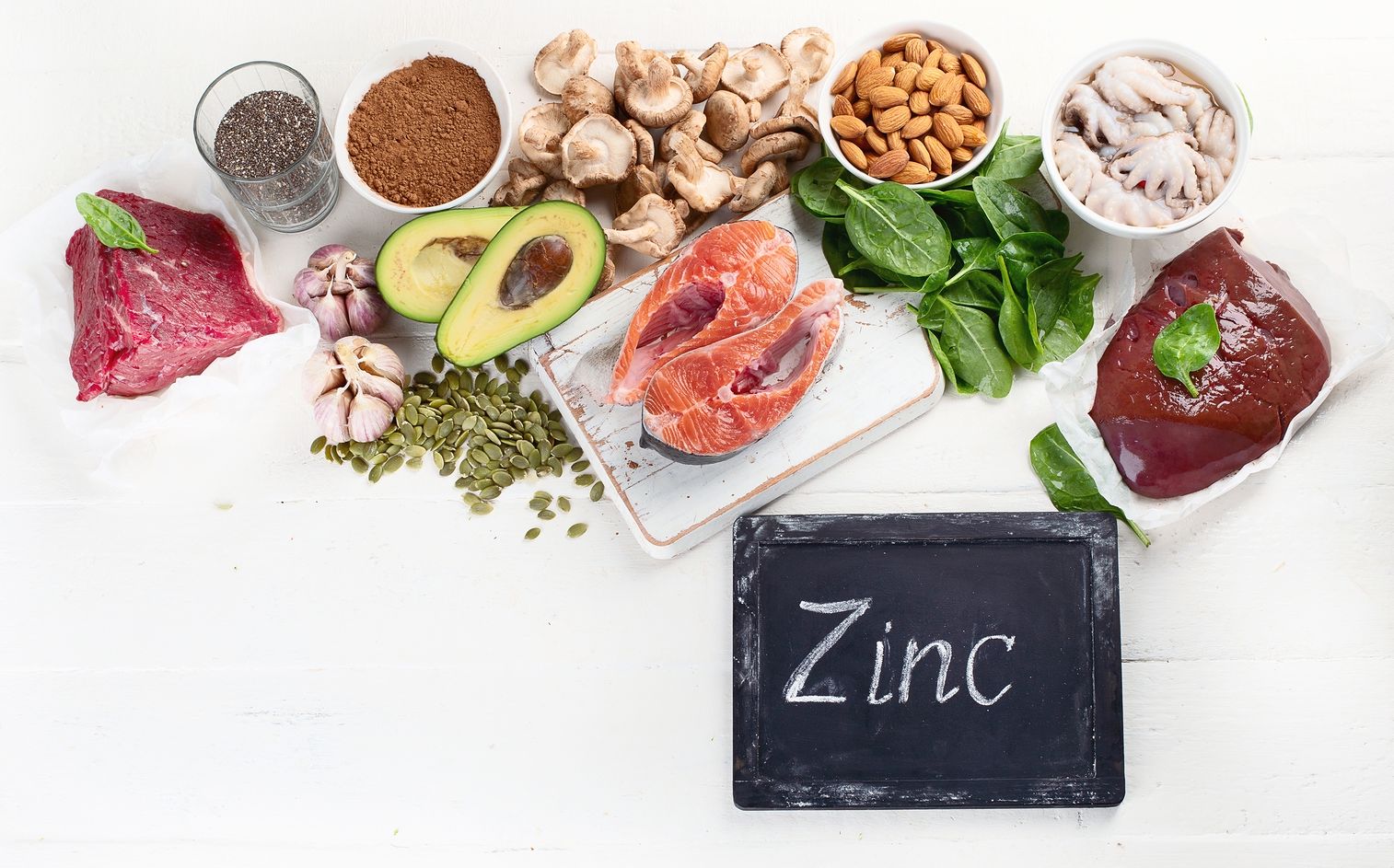
Zinc is a chemical element that is essential for the proper functioning of many systems in the body. It is particularly important for the nervous system, as well as the immune and circulatory systems. It is also an important component of enzymes that regulate the metabolism of proteins and fats and which can cause health problems such as anemia, nervous system problems.
- Zinc - properties
- Zinc - what are the standards?
- Products rich in zinc
- Zinc - deficiency symptoms
- Zinc supplementation
Zinc - properties
Zinc is an essential trace element for humans, being part of more than 300 enzymes. It is involved in the metabolism of proteins, carbohydrates and fats, as well as energy metabolism. It is essential for the synthesis of proteins, the production of hormones (testosterone, insulin, thyroxine - T4), maintaining the stability of cell membranes, the function of the sex glands and the normal functioning of the central nervous system. Its function is also involved in alcohol metabolism, vitamin A metabolism, the body's immune defense, taste and smell sensation, and intercellular communication. It is necessarily worth noting at this point that the human body does not have the ability to store stores of zinc, so it is important to regularly provide adequate amounts of this micronutrient with the diet.
Zinc - what are the standards?
According to the current dietary standards for the Polish population developed by the National Institute of Public Health - National Institute of Hygiene, the recommended daily allowance (RDA) for zinc is shaped accordingly:
- Infants up to 6 months of age - 2 mg (AI - adequate intake level),
- Infants between 7 and 11 months of age - 3 mg,
- Children from 1 to 3 years of age - 3 mg,
- Children from 4 to 9 years of age - 5 mg,
- Boys and girls from 10 to 12 years of age - 8 mg,
- Girls from 13 to 18 years of age - 9 mg,
- Boys from 13 to 18 years of age - 11 mg,
- Men aged 19 and over - 11 mg,
- Women aged 19 and over - 8 mg,
- Pregnant women up to age 19 - 12 mg,
- Pregnant women over 19 years of age - 11 mg,
- Breastfeeding women up to age 19 - 13 mg,
- Breastfeeding women over 19 years of age - 12 mg.
Products rich in zinc
Foods that are exceptionally rich in zinc include: seafood (e.g., lobster, oysters, crabs), liver, pumpkin seeds, bitter cocoa and its products (e.g., dark chocolate with a high cocoa solids content), rennet cheeses (e.g., Gouda and Emmentaler cheese), coarse grain cereal products (such as.: mountain oatmeal, buckwheat groats, wholemeal rye bread, muesli, bran and wheat germ), baker's yeast, nuts, almonds, seeds (e.g., flaxseed, sunflower seeds), pumpkin seeds, eggs, meat (e.g., beef, pork, lamb, poultry) and dry pulses. It is worth noting that zinc is much better absorbed by the body from animal products than from plant products, which are characterized by phytates that reduce the bioavailability of zinc. Other nutrients that have a negative impact on the absorption process include: oxalic acid, nonheme iron, copper and some dietary fiber fractions (such as insoluble lignans). And ingredients that have a positive effect on absorption from the gastrointestinal tract include animal protein, certain amino acids (e.g. asparagine) and organic acids (e.g. citric, malic).
Zinc - deficiency symptoms
If the diet is varied and well-balanced, the average daily intake of zinc is in the range of 10 to 20 mg, which, according to current dietary standards for the Polish population, does not cause a major risk in terms of deficiency or excess of this micronutrient. However, in a situation where the diet is for a long time extremely restrictive, low-calorie and/or based on foods of low nutritional value, the daily supply of zinc in the diet may be insufficient to meet the needs of the body. The most common symptoms of deficiency in adults include skin lesions, hair loss, impaired wound healing, impaired sense of smell and taste, decreased immunity, night blindness, and atrophy of the thymus gland and lymph nodes.
Zinc supplementation
Current research shows that dietary zinc supplementation can shorten the duration of a cold by about 33%. Patients with a cold should start taking this element within 24 hours of the onset of the first symptoms. There is some evidence to suggest that zinc-enriched dietary supplementation may reduce the risk of developing acute viral respiratory infections in an adult population unlikely to be deficient in zinc. Zinc used to treat viral respiratory tract infections has also been found to shorten the duration of symptoms and reduce their severity by day three. To top it off, the results of a recent meta-analysis involving 5 studies with a total of 1,398 participants showed that dietary zinc supplementation is associated with a 43% lower mortality rate in patients with COVID-19. However, not all studies conducted to date conclusively show a positive effect of zinc on its course. Interestingly, there is also some indication that zinc-enriched dietary supplementation may contribute to moderate weight loss in overweight and obese individuals without comorbidities.
Zinc supplements - the most bioavailable forms
Zinc in medicinal preparations and dietary supplements is most often found in the form of citrate, gluconate or oxide. The most bioavailable is that in the form of gluconate and citrate, while zinc oxide is bioavailable only to a small extent. If additional dietary supplementation is needed, it is best to reach for a preparation registered as an over-the-counter (OTC) drug, as drug manufacturers are required to demonstrate its efficacy and/or safety profile before marketing.
Sources:
- Sanna A., Firinu D., Zavattari P., et al: Zinc Status and
Autoimmunity: A Systematic Review and Meta-Analysis. Nutrients. 2018
Jan 11;10(1):68. - Khorsandi H., Nikpayam O., Yousefi R., et al: Zinc supplementation improves body weight management, inflammatory biomarkers and insulin resistance in individuals with obesity: a randomized, placebo-controlled, double-blind trial. Diabetol Metab Syndr. 2019 Dec 2;11:101.
- Abdollahi S, Toupchian O, Jayedi A, et al: Zinc Supplementation and Body Weight: A Systematic Review and Dose-Response Meta-analysis of Randomized Controlled Trials. Adv Nutr. 2020 Mar 1;11(2):398-411.
- Wang MX, Win SS, Pang J., et al: Zinc Supplementation Reduces Common Cold Duration among Healthy Adults: A Systematic Review of Randomized Controlled Trials with Micronutrients Supplementation. Am J Trop Med Hyg. 2020 Jul;103(1):86-99.
- Jarosz M., Rychlik E., Stoś K. et al: Nutrition standards for the Polish population and their application. National Institute of Public Health - National Institute of Hygiene, 2020.
- Hunter J, Arentz S, Goldenberg J, et al: Zinc for the prevention or treatment of acute viral respiratory tract infections in adults: a rapid systematic review and meta-analysis of randomised controlled trials. BMJ Open. 2021 Nov 2;11(11):e047474.
- Tabatabaeizadeh SA.: Zinc supplementation and COVID-19 mortality: a meta-analysis. Eur J Med Res. 2022 May 23;27(1):70.
 ⮜ Previous article
⮜ Previous article
Ashwagandha - an effective supplement for stress
 Next article ⮞
Next article ⮞